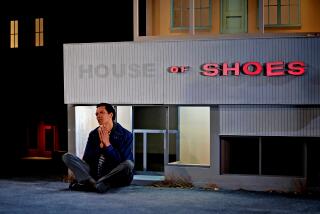Criticâs Choice: Rainn Wilson finds the laughs in loneliness in âThom Pain (Based on Nothing)â
Do you like magic? Itâs the first of many questions about which the eponymous narrator of âThom Pain (Based on Nothing)â remains deeply ambivalent. Equivocation, for him, lies at the core of human experience, or perhaps not.
No such ambiguity taints the magic of Rainn Wilsonâs deft solo performance, however, as the 2004 play by Will Eno makes its long-awaited L.A. premiere at the Geffen Playhouse.
Gleefully deconstructing our understanding and expectations of theatrical form, storytelling and even audience participation, Enoâs brilliantly crafted monologue is a direct descendant of the spare, absurdist writings of Samuel Beckett.
A deceptively drab, nondescript figure on a threadbare stage, Wilsonâs postmodern everyman engages us directly in rambling, hyperlinked anecdotes, observations and non sequiturs that reveal nothing more of his characterâs history, motivation or feelings beyond elliptically doled-out words. Also as in Beckett, the search for meaning and certainty are paradoxically upended: âThe truth? I donât care either way,â he confesses. âThatâs not true. I do care, either way.â
Oliver Butlerâs superb direction keeps Wilson keenly attuned to the scriptâs multilayered cadences. âIâm trying,â he says at one point, pausing just long enough for us to realize itâs not an assertion of good intention but, rather, an admission of character defect.
The double-edged wordplay both acknowledges and keeps at bay the somber theme of lifeâs unfulfilled promise threading the monologueâs riffs on fear, childhood traumas, loss of innocence and inability to find oneâs footing in the world. Despite the absence of a linear narrative progression, the piece steadily builds dramatic momentum as it cycles through its seemingly disparate recurring elements, ultimately conflating them in a haunting dreamlike reverie. The scriptâs modulations in tone are precisely honored, even if some fine-tuning is needed to make the softest-spoken moments more audible.
âThom Painâ may, indeed, be âbased on nothing,â as its subtitle suggests, but itâs actually about nothing-ness, which is really something in this day and age.
Counterbalancing this alienation is Enoâs unique comic voice â often described as âstand-up existentialismâ â to which Wilsonâs impeccable deadpan delivery is ideally suited. Recalling an epic romance that briefly dispelled his âunaloneness,â Thom Pain explains the reasons for its failure: âI disappeared in her and she, wondering where I went, left.â
Itâs one of the few moments when Thom takes ownership of an experience. Most of his stories are related in the third person and thus only autobiographical by implication. In his declared intention âto be, to my own self, untrueâ lies the playâs insightful diagnosis of our collective existential malady: the pervasive false self, for which inwardness and reflection become only tools of reassurance and validation rather than self-discovery.
Offsetting all its angst, however, is the playâs final evocation of magic in the simple fact of existence: It may not be much, but maybe itâs enough to keep us going.
âThom Pain (Based on Nothing),â Audrey Skirball Kenis Theater at the Geffen Playhouse, 10886 Le Conte Ave., Los Angeles. 8 p.m. Wednesdays through Fridays, 3 and 8 p.m. Saturdays, 2 p.m. Sundays. Ends Feb. 14. $76-$99. (310) 208-5454, www.geffenplayhouse.com. Running time: 65 minutes.
More to Read
The biggest entertainment stories
Get our big stories about Hollywood, film, television, music, arts, culture and more right in your inbox as soon as they publish.
You may occasionally receive promotional content from the Los Angeles Times.










